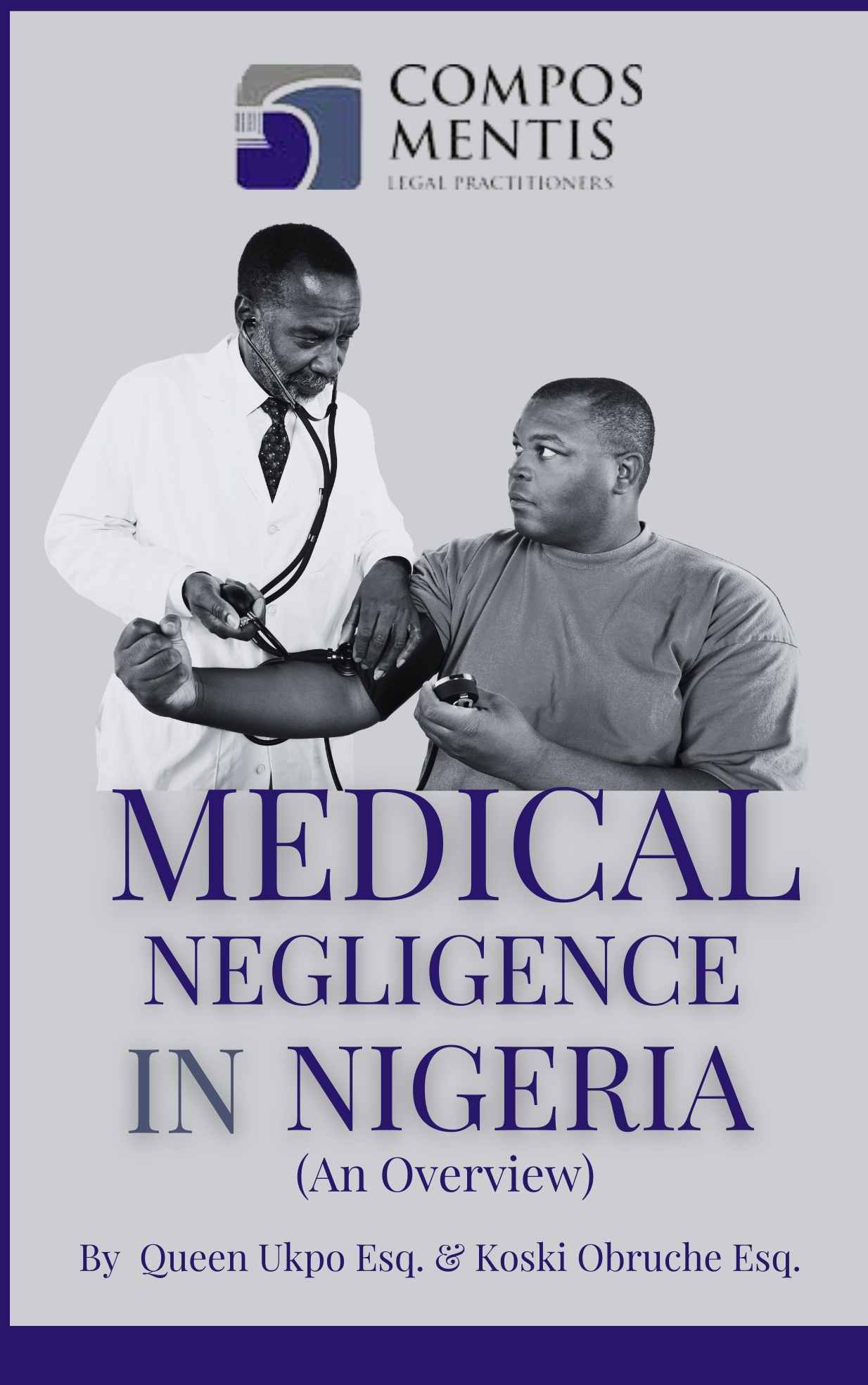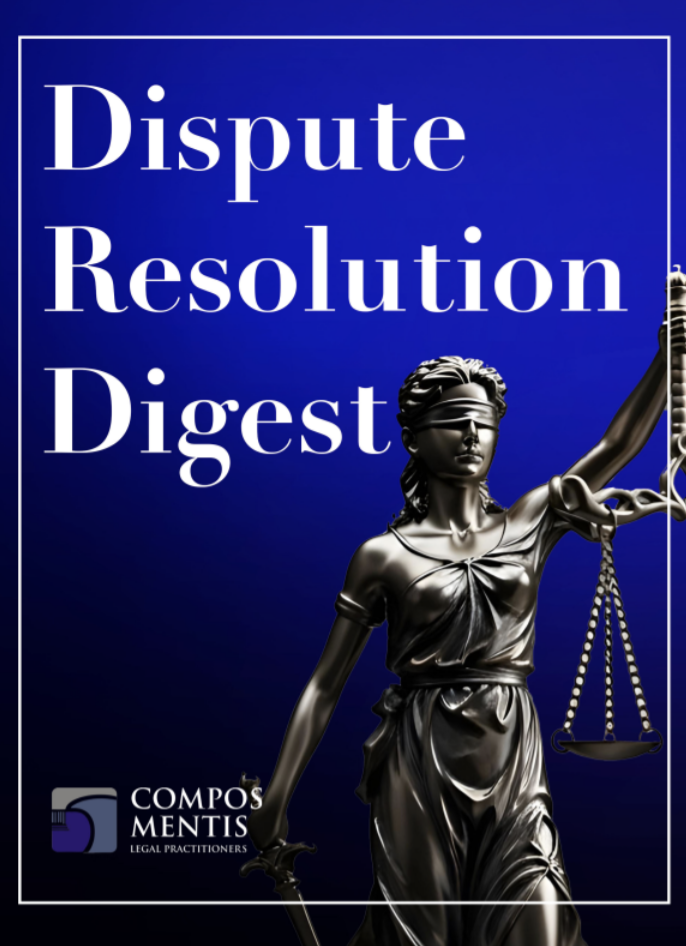1.0 Introduction
Medical professionals owe their patients a duty of care and an action for medical negligence can be founded on a breach of that duty which results in an injury. Examples of medical negligence abound notwithstanding that they are grossly underreported.1 For instance, in Nigeria, a patient who was suffering from typhoid was misdiagnosed and treated for toilet infection. In another case, a healthy expectant mother would have been subjected to a needless Caesarean Session due to an illusory STI had she not sought a second medical opinion abroad. The legal icon, Chief Gani Fawehinmi, was also a victim of medical negligence. He received treatment for pneumonia in Nigeria instead of cancer. The cancer had reached an advanced stage at the time he got the correct diagnosis abroad. Indeed, medical negligence is not restricted to a third-world country like Nigeria. As a matter of fact, the late Professor Dora Akunyili was reported to have been correctly diagnosed with cancer in Nigeria. However, her physicians in the US overruled the finding and gave her an all clear. That medical negligence is also commonplace in the advanced world is evidenced by the estimated cost of 1.20 billion dollars paid as compensation for medical negligence in the United Kingdom annually. The need to discourage medical negligence cannot be overemphasized as it poses a severe risk to patients. Therefore, this short piece shall attempt to give a brief overview of medical negligence in Nigeria from a legal perspective. The goal is to enlighten stakeholders on their rights and obligations.
2.0 What is Medical Negligence?
Negligence is a breach of a duty of care which results in injury. The essential ingredients of negligence in law are: (a) duty of care owed by the defendant to the plaintiff; (b) breach of that duty by the defendant; and (c) damage to the plaintiff resulting from the breach.
The point must be made that there is a difference between negligence simpliciter and professional negligence. While the test for the former is that of an ordinary prudent man under similar circumstances, the test for the latter is that of an ordinary prudent man professing the relevant skill. The Court of Appeal explained this point in the following words:
Generally, in the ordinary case which does not involve any special skill, negligence in law means omission or failure to do something which a reasonable man, under similar circumstances would do or that which a reasonable man would not do. Ifthat failure results in injury, then there is a cause of action. The test on whether an act amounts to professional negligence is that of standard of the ordinary skilled man exercising and professing to have that special skill.
Anyone who holds himself out as a medical man is duty bound to exercise the highest degree of care. It matters not that he is relatively inexperienced. This was the decision of the court in Jones v Manchester Corporation. In that case, a trainee anesthetist tried a nitrous oxide mask on a patient with facial burns which resulted in a slough of the patient’s facial skin. He thereafter administered two loading doses of barbiturate and this led to the death of the patient. The court rejected his inexperience as a defence. The court ordered him to pay 20% of the damages and his employer the outstanding 80%. Suffice it to say that medical negligence is the failure of a medical professional to exercise reasonable care and skill expected of a professional with the same level of skill.
Further, not every mistake made by a medical man amounts to medical negligence. It would only be so construed if it is deserving of censure by his professional brethren of good repute and competency. The justification for this is that every medical procedure has inherent risks. Accordingly, it would be unfair and against public policy for the healthcare provider to be subjected to a state of constant fear while practicing his craft.
3.0 Statutory Provisions
There are various statutory provisions on medical negligence. For instance, failure to exercise reasonable care and skill by a medical practitioner is a criminal offence which attracts imprisonment for a term of one year. Also instructive are the provisions in the Acts governing the various professions in the healthcare sector in Nigeria. They penalize infamous conducts in a professional respect. Essentially, the sanctions range from reprimand to suspension, striking out of name from professional register, and refund of monies or property. That medical negligence amounts to infamous conduct in a professional respect is rather too obvious to be subjected to any form of debate. This can be gleaned from Lord Denning’s passage referred to in footnote. In Allison v General Medical Council, infamous conduct in professional respect was defined as:
where a medical man in pursuit of his profession has done something with regard to which it would be reasonably regarded as disgraceful or dishonourable by his professional brethren of good repute and competency.
It has also been described as “an act or omission which in the Legal Practitioners’ Disciplinary Committee opinion is such that will bring the profession into disrepute.”17 In Oguguo v Medical Dental Practitioners Disciplinary Tribunal,18 the Court of Appeal stated that:
…in the determination of the nature of professional misconduct (which amounts to) infamous conduct in a professional respect, the Court is to consider whether the practitioner’s conduct or omission fall short or below the standard of conduct expected among and from the practitioners of the profession and so infringes or breaches the code of conduct which governs and regulate the practice of the professionals.
4.0 Proof of Medical Negligence
The burden of proof of medical negligence rests on the claimant who asserts. The burden is discharged when the claimant leads credible evidence to establish the three essential elements of negligence outlined earlier. The Court of Appeal stated the position of the law as follows:
The law is also settled that in an action for negligence, the Plaintiff (Claimant) is entitled only to recover on the particulars of negligence pleaded and proved to the satisfaction of the trial Court. Accordingly, it is insufficient and inappropriate for a Claimant to make a blanket allegation of negligence against a Defendant without giving full particulars of the items of negligence relied on as well as the duty of care owed him by the Defendant.
The courts are fully aware of the enormity of the burden placed on the layman to prove claims founded on medical negligence. The medical field is a highly specialized one and this has made the calling of expert witness indispensable in medical negligence causes. While acknowledging the plight of claimants on this score, the Court of Appeal has the following to say:
I wish to just observe that claims founded on medical negligence have been known to be difficult to establish and expensive as well. The evidence to be adduced by the injured usually is in the domain of the hospital and doctors. Where records in hospital are tendered in Court it does not have much impact. The injured will inevitably rely on expert testimony to tell the Court whether a reasonable person in the position of the doctor would have made the same diagnosis, treatment or procedure adopted.
The failure of the Appellant to call an expert witness in Abi v CBN & Ors (supra) was held to be fatal to his case. The Respondent in Delta State Hospitals Mgt Board & Ors v Onome (supra) met the same fate for the reason.
The only exception to the aforementioned general rule is where the facts of the case warrant the plea of res ipsa loquitur (the thing speaks for itself). All the claimant needs to do in such instance is to prove the result of the negligence and urge the court to infer negligence therefrom. Res ipsa loquitur applies to incidents which do not occur in the ordinary course of events but for negligence. If the court accepts the plea, the burden to adduce evidence to rebut the presumption of negligence will then rest squarely on the defendant. What is more, a claimant who intends to call in aid res ipsa loquitur must ward off the temptation of leading evidence on how the negligence occurred. It is trite that once evidence is led to that effect, the claimant’s case shall only succeed on its strength. This is premised on the rule which forbids supplementing inconclusive evidence with ipsa loquitur.
5.0 Who Can Sue and Be Sued for Medical Negligence?
An action for medical negligence is a personal action. Consequently, it is the patient who actually suffered the injury that possesses the requisite locus to file an action against the negligent medical professional and his employer. This general rule is without prejudice to the right of persons under legal disability to maintain an action through their parents/guardians pursuant to the various rules of courts. The next of kin of a deceased victim of medical negligence may also institute an action for damages for wrongful death. This was the case in Delta State Hospitals Mgt Board & Ors v Onome (supra).
However, what would be the fate of a medical negligence suit if a necessary party on either side of the divide dies before it is concluded? The common law maxim actio personalis moritur cum persona (a personal action does not survive death) may pose a challenge here. In Bamidele v Ogundipe & Ors (supra), the Court of Appeal cited with approval an Indian case to reject a motion by the Appellant to substitute the deceased First Respondent with the administrator of his estate. In the Indian case, it was held that in a tort of medical negligence, the cause of action is personal against the person who has been negligent in performing his duties and the cause of action does not survive against the estate or legal representatives. The effect of this is that the employer of a deceased negligent medical practitioner may be left off the hook since the employee is the necessary link between an employer and a cause of action in vicarious liability. It is submitted that the decision of the Court of Appeal in the Bamidele’s case might have been different if section 15 of the Administration of Estate Law 1959 as adopted by states in the former Western Region was brought to its attention. Section 15(1) provides as that:
Subject to the provisions of this section, on the death of any person after the commencement of this Law all causes of action subsisting against or vested in him shall survive against or, as the case may be, for the benefit of his estate: Provided that this subsection shall not apply to causes of action for defamation or seduction or for inducing one spouse to leave or remain apart from the other or to claims for damages on the ground of adultery.
The Court of Appeal relied on Section 15 of the Administration of Estate Law of Lagos State, which is in pari materia with the above section, to substitute a deceased appellant with the executors of his estate in a case alleging unlawful termination of employment.
6.0 Options available to victims of medical negligence in nigeria
A. Civil Jurisdiction: Negligence is actionable as a tortious claim. Here, the victim will have to establish the ingredients of the tort of negligence to succeed.
B. Criminal Jurisdiction: Negligence is not actionable per se in criminal jurisdiction. However, medical negligence interwoven with criminal matters can be brought as charges in respect to offences provided under the Criminal Code Act. Thus, if in the course of medical negligence, death results, the erring professional can be charged for murder or manslaughter depending on the circumstances.
C. Professional Body: As an example, the Medical and Dental Practitioners Act, provides for the establishment of the Medical and Dental Practitioners Disciplinary Tribunal. The Tribunal is charged with the responsibility of the maintenance of ethics and discipline of unethical medical practitioners. Accordingly, a victim of medical negligence can approach the tribunal for respite.
7.0 Limitation of Action
Generally, the limitation period for an action based on medical negligence is three years from the date that the cause of action arose. However, where the claimant is under disability the limitation period is six years from the date the claimant ceases to be under the disability or dies. Section 36 will not apply if the person under disability is in custody of his parent or guardian at the time the cause of action accrued. In Abi v CBN (supra), the Court of Appeal held that since the Appellant alleged loss of hearing due to medical negligence, section 36(2) of the Limitation Act would avail him.
8.0 Conclusion
Medical negligence is a threat to public health. This article has given a bird’s-eye view of the subject matter. Healthcare providers are enjoined to strictly abide by professional standards. Finally, intending claimants are encouraged to be abreast of their rights and put their houses in order should they elect to file an action for medical negligence.






Post a comment